Are The “Magnificent 7” Stocks Today’s Version Of The “Nifty Fifty”?

Image Source: Pexels
The “Magnificent 7” are TSLA, AAPL, META, GOOG, MSFT, AMZN, NVDA. Buy and hold forever?

(Click on image to enlarge)
MAGS ETF courtesy of Stockcharts.com, annotations by Mish
Nifty Fifty
In the United States, the term Nifty Fifty was an informal designation for a group of roughly fifty large-cap stocks on the New York Stock Exchange in the 1960s and 1970s that were widely regarded as solid buy and hold growth stocks, or “Blue-chip” stocks. These fifty stocks are credited by historians with propelling the bull market of the early 1970s, while their subsequent crash and underperformance through the early 1980s are an example of what may occur following a period during which many investors ignore fundamental stock valuation metrics, to instead make decisions on popular sentiment. Roughly half of the Nifty Fifty have since recovered and are solid performers, although a few are now defunct or otherwise worthless.
Investor Howard Marks reports that about half of the Nifty Fifty “compiled respectable returns for 25 years, even when measured from their pre-crash highs, suggesting that very high valuations can be fundamentally justified.” On the other hand, Professor Jeremy Siegel analyzed the Nifty Fifty era in his book Stocks for the Long Run, and determined companies that routinely sold for P/E ratios above 50 consistently performed worse than the broader market (as measured by the S&P 500) in the next 25 years, with only a few exceptions.
Roundhill MAGS
The Roundhill Investments MAGS idea likely represents peak sentiment.
If you are just now a MAGS fan, your timing is more than a bit off.

(Click on image to enlarge)
Do You Like Amazon Here?

(Click on image to enlarge)
Do You Like Tesla Here?

(Click on image to enlarge)
Do You Like Nvidia Here?

(Click on image to enlarge)
Peak Sentiment
All of the above companies are excellent companies. But what price are you willing to pay for them?
Yes, one could have asked that same questions at nearly any point in the past and be ahead. But corrections are likely to be very steep.
Good companies are not the same as good stocks to buy. Between 2022 and 2023, Amazon fell from $188.21 to $81.43 That’s a 57 percent decline.
Between 2022 and 2023, TSLA fell from $414.50 to $101.81. That’s a decline of 75%.
Is Tesla a car company or something else? I don’t think we even know that yet, but it’s priced for something much larger.
It’s much harder to make up for losses than it is to find opportunities.
This action and sentiment now strikes me the same way the Nasdaq blowoff technology bubble did in 2000 and the housing bubble did in 2007.
Good luck with the Magnificent 7 if you are in that trade. You will need it.
More By This Author:
Big Changes In Fed Interest Rate Cut Expectations This Year And NextDramatic 1-Day And 1-Week Changes In Bond Yields, What Happened?
The McKelvey (Sahm) Unemployment Rate Recession Rule Just Triggered
Disclaimer: The content on Mish's Global Economic Trend Analysis site is provided as general information only and should not be taken as investment advice. All site content, including ...
more


